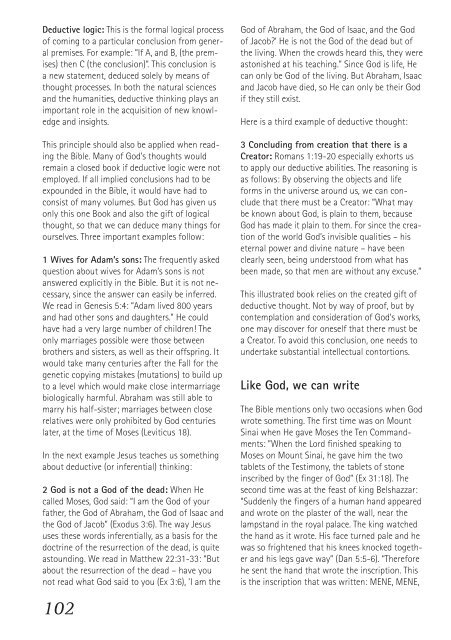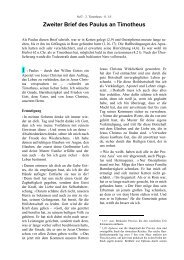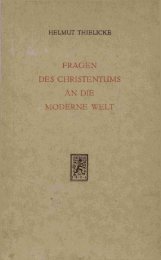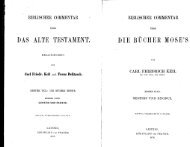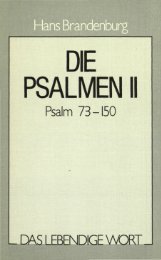You also want an ePaper? Increase the reach of your titles
YUMPU automatically turns print PDFs into web optimized ePapers that Google loves.
Deductive logic: This is the formal logical process<br />
of coming to a particular conclusion from general<br />
premises. For example: “If A, and B, (the premises)<br />
then C (the conclusion)”. This conclusion is<br />
a new statement, deduced solely by means of<br />
thought processes. In both the natural sciences<br />
and the humanities, deductive thinking plays an<br />
important role in the acquisition of new knowledge<br />
and insights.<br />
This principle should also be applied when reading<br />
the Bible. Many of God’s thoughts would<br />
remain a closed book if deductive logic were not<br />
employed. If all implied conclusions had to be<br />
expounded in the Bible, it would have had to<br />
consist of many volumes. But God has given us<br />
only this one Book and also the gift of logical<br />
thought, so that we can deduce many things for<br />
ourselves. Three important examples follow:<br />
1 Wives for Adam’s sons: The frequently asked<br />
question about wives for Adam’s sons is not<br />
answered explicitly in the Bible. But it is not necessary,<br />
since the answer can easily be inferred.<br />
We read in Genesis 5:4: “Adam lived 800 years<br />
and had other sons and daughters.” He could<br />
have had a very large number of children! The<br />
only marriages possible were those between<br />
brothers and sisters, as well as their offspring. It<br />
would take many centuries after the Fall for the<br />
genetic copying mistakes (mutations) to build up<br />
to a level which would make close intermarriage<br />
biologically harmful. Abraham was still able to<br />
marry his half-sister; marriages between close<br />
relatives were only prohibited by God centuries<br />
later, at the time of Moses (Leviticus 18).<br />
In the next example Jesus teaches us something<br />
about deductive (or inferential) thinking:<br />
2 God is not a God of the dead: When He<br />
called Moses, God said: “I am the God of your<br />
father, the God of Abraham, the God of Isaac and<br />
the God of Jacob” (Exodus 3:6). The way Jesus<br />
uses these words inferentially, as a basis for the<br />
doctrine of the resurrection of the dead, is quite<br />
astounding. We read in Matthew 22:31-33: “But<br />
about the resurrection of the dead – have you<br />
not read what God said to you (Ex 3:6), ’I am the<br />
102<br />
God of Abraham, the God of Isaac, and the God<br />
of Jacob?’ He is not the God of the dead but of<br />
the living. When the crowds heard this, they were<br />
astonished at his teaching.” Since God is life, He<br />
can only be God of the living. But Abraham, Isaac<br />
and Jacob have died, so He can only be their God<br />
if they still exist.<br />
Here is a third example of deductive thought:<br />
3 Concluding from creation that there is a<br />
Creator: Romans 1:19-20 especially exhorts us<br />
to apply our deductive abilities. The reasoning is<br />
as follows: By observing the objects and life<br />
forms in the universe around us, we can conclude<br />
that there must be a Creator: “What may<br />
be known about God, is plain to them, because<br />
God has made it plain to them. For since the creation<br />
of the world God’s invisible qualities – his<br />
eternal power and divine nature – have been<br />
clearly seen, being understood from what has<br />
been made, so that men are without any excuse.”<br />
This illustrated book relies on the created gift of<br />
deductive thought. Not by way of proof, but by<br />
contemplation and consideration of God’s works,<br />
one may discover for oneself that there must be<br />
a Creator. To avoid this conclusion, one needs to<br />
undertake substantial intellectual contortions.<br />
Like God, we can write<br />
The Bible mentions only two occasions when God<br />
wrote something. The first time was on Mount<br />
Sinai when He gave Moses the Ten Commandments:<br />
”When the Lord finished speaking to<br />
Moses on Mount Sinai, he gave him the two<br />
tablets of the Testimony, the tablets of stone<br />
inscribed by the finger of God” (Ex 31:18). The<br />
second time was at the feast of king Belshazzar:<br />
“Suddenly the fingers of a human hand appeared<br />
and wrote on the plaster of the wall, near the<br />
lampstand in the royal palace. The king watched<br />
the hand as it wrote. His face turned pale and he<br />
was so frightened that his knees knocked together<br />
and his legs gave way” (Dan 5:5-6). “Therefore<br />
he sent the hand that wrote the inscription. This<br />
is the inscription that was written: MENE, MENE,


